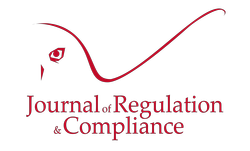🎤 Definition of Principle of Proportionality and Definition of Compliance Law ("Définition du Principe de Proportionnalité et Définition du Droit de la Compliance"), in 📅Compliance and Proportionality. From the control of Proportionality to the proportionality of the Control ("Compliance et proportionnalité. Du contrôle de proportionnalité à la proportionnalité du contrôle")
ComplianceTech® ↗️ pour lire cette présentation en français, cliquer sur le drapeau français

► Full Reference: Frison-Roche, M.A., Definition of Principle of Proportionality and Definition of Compliance Law ("Définition du Principe de Proportionnalité et Définition du Droit de la Compliance"), in Frison-Roche, M.-A. et Rapp, L. (dir.), Compliance and Proportionality. From the control of Proportionality to the proportionality of the Control ("Compliance et proportionnalité. Du contrôle de proportionnalité à la proportionnalité du contrôle") Compliance et Proportionnalité. Du contrôle de proportionnalité à la proportionnalité du contrôle, juges pour la Compliance, Colloque coorganisé par le Journal of Regulation & Compliance (JoRC) et la Chaire SIRIUS (IDETCOM), 14 octobre 2021.
____
📅 read the conference program
📅 this colloquium is part of the cycle of colloquia 2021 organised by the Journal of Regulation & Compliance (JoRC) and its partners on the Compliance Monumental Goals topic.
____
🚧 read the Working Paper on the basis of which the conference was done and from which the reactions took place.
____
►see the slides supporting the conference (in French)
► Conference Summary: The use of Proportionality t always limit powers is only justified when it is about sanctions, but sanctions are only one tool among others in Compliance Law, intended moreover to have little place in this Ex Ante branch of Law. And returning to the very nature of Compliance Law, which relies on operators, private or public, because they are powerful, then using proportionality to limite powers is detrimental to Compliance Law.
However, nothing requires that. Compliance Law is not an exception that should be limited. On the contrary, it is a branch of Law which carries the greatest principles, aimed at protecting human beings and whose Normativity lies in its "Monumental Goals": detecting and preventing future major systemic crisis (financial, health and climate ones).
However, literally the principle of Proportionality is: "no more powers than necessary, as many powers as necessary".
The second part of the sentence is independent of the first: this must be used.
Politics having fixed these Monumental Goals, the entity, in particular the company, must have, even tacitly, "all the necessary powers" to achieve them. For example the power of vigilance, the power of audit, the power over third parties. Because they are necessary to fulfill the obligations that these "crucial operators" have to perform as they are "in a position" to do so.
So instead of limiting the powers, the Principe of Proportionality comes to support the powers, to legitimize them and to increase them, so that we have a chance that our future is not catastrophic, perhaps better.
In this respect, Compliance Law, in its rich Definition, will itself have enriched the Principle of Proportionality.
____
► the conference and the Working Paper are the basis for an article in the book⤵
► in its French version 📕 Les Buts Monumentaux de la Compliance, in the Series 
► in its English version 📘Compliance Monumental Goals , dans la collection 
_________
comments are disabled for this article